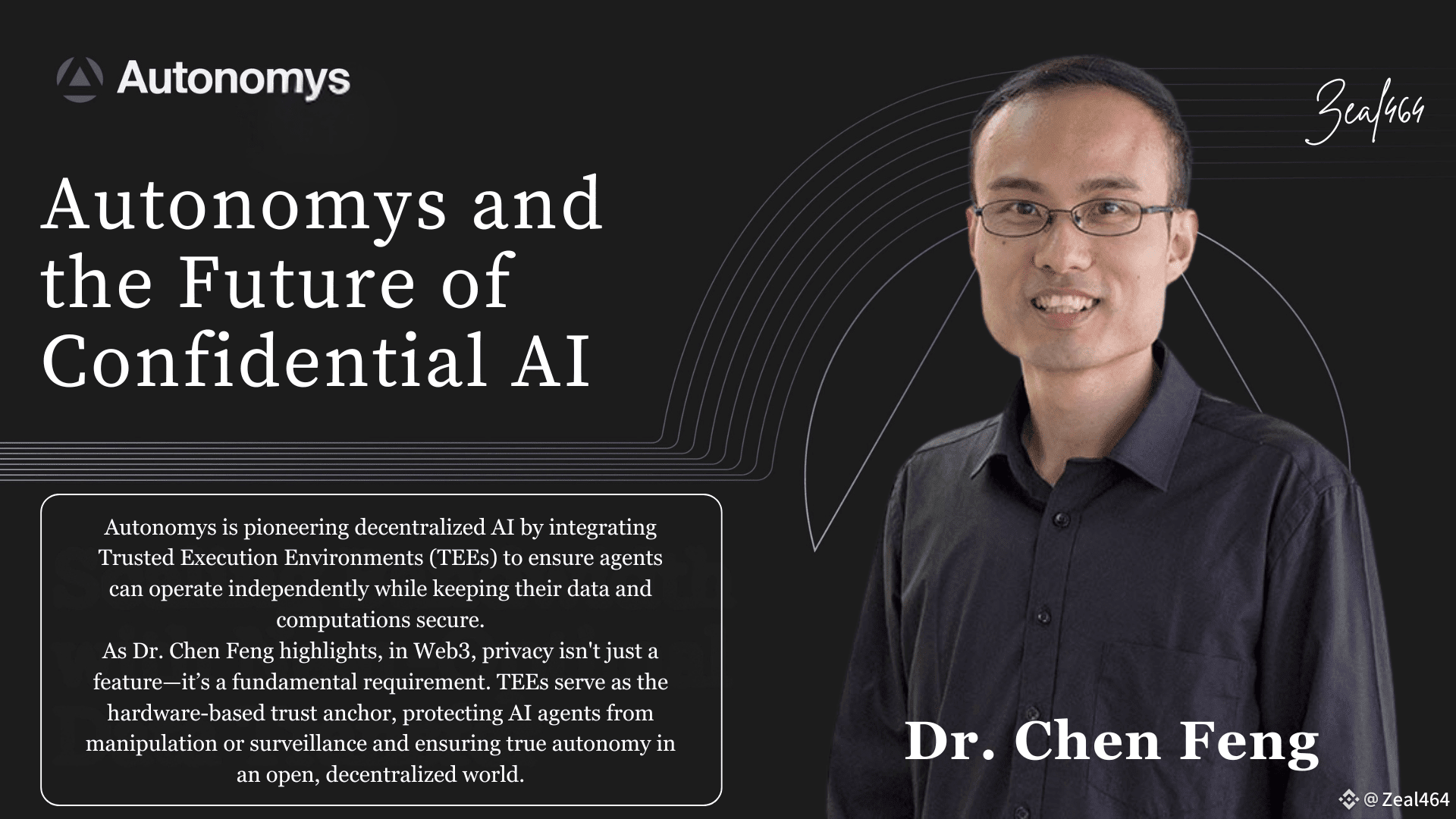
In a world where AI agents are becoming smarter, faster, and more independent, the question of trust is no longer philosophical—it’s infrastructural. At the heart of this conversation is Dr. Chen Feng, Head of Research at Autonomys Network and a Professor at the University of British Columbia.
In his recent podcast appearance on Spilling the TEE, Dr. Feng painted a compelling vision for the future of Confidential AI, with a powerful metaphor: Trusted Execution Environments (TEEs) are the castles of digital trust—hardware fortresses that secure AI logic and data from prying eyes.

🧠 What are TEEs—and Why Do They Matter?
Trusted Execution Environments (TEEs) are secure zones within a processor that isolate and protect computations. Unlike cryptographic methods such as Zero-Knowledge Proofs (ZKPs), Multi-Party Computation (MPC), or Fully Homomorphic Encryption (FHE)—which often come with performance trade-offs—TEEs offer near-native execution speeds with minimal overhead.
As Dr. Feng explains:
> "ZKPs and MPC are great for specific use cases, but when we want AI agents to act in real time—on the edge, in the wild—TEEs give us both performance and confidentiality."
That’s why #AutonomysNetwork integrates TEEs at the core of its decentralized AI infrastructure. The goal? To enable AI agents that are autonomous, privacy-preserving, and verifiably secure.
🔐 Confidentiality is Non-Negotiable
In the emerging agent-driven Web3 world, data isn’t just valuable—it’s volatile. Dr. Feng stresses that privacy isn't a nice-to-have—it’s a requirement.
> “Without confidentiality, autonomy is just a façade,” he notes. “TEEs provide the hardware root of trust to make autonomy real.”
With TEEs, AI agents can process sensitive data—such as financial inputs, personal identifiers, or proprietary models—without leaking it or becoming vulnerable to tampering. That’s the kind of assurance the decentralized future demands.

🔎 Solving the Oracle Problem with Verifiability
Another key insight from Dr. Feng? TEEs help solve the Oracle Problem—how to trust that AI outputs aren’t manipulated. TEEs support remote attestation, allowing anyone to verify that code executed securely, without interference.
This verifiability builds the foundation for agent accountability—a concept as crucial to Web3 as decentralization itself.
🌐 A Word on Engagement: What's Trending?
While we build the foundation for trusted AI with TEEs, the broader Web3 space is also buzzing. To capture the energy and eyes of the crypto community, here are a few trending tokens you might want to watch:
Solaxy ($SOLX) – A Solana-based project offering high-speed Layer 2 functionality and strong staking appeal.
Mind of $PEPE – A meme-meets-AI coin with a vibrant community and cultural momentum.
$DOGE – Making noise for its scalability focus and rapidly growing ecosystem.
Best Wallet ($BEST) – Reinventing the crypto wallet experience with social and utility-based features.
These projects reflect the dynamic innovation happening alongside the core infrastructure developments that leaders like Autonomys are driving forward.
✊ As a proud Social Miner at the AutonomysNet Social Mining hub powered by @DAO Labs ...
…I’m inspired by the depth of Dr. Feng’s vision. This isn’t just another Web3 trend—it’s the future of how we trust machines. TEEs, as the backbone of Confidential AI, are helping usher in a new era where intelligent agents can act independently and securely—without compromising the user or the system.

🧩 Final Thought: Building Castles in Code
In the age of autonomous agents, trust is everything—and Dr. Chen Feng’s castles of trust aren’t just a metaphor. They’re real, they’re functional, and they’re already being built at Autonomys.
The future belongs to systems that don’t just compute, but compute confidentially, verifiably, and autonomously.
Welcome to the age of ConfidentialAI. 🧠🔐

